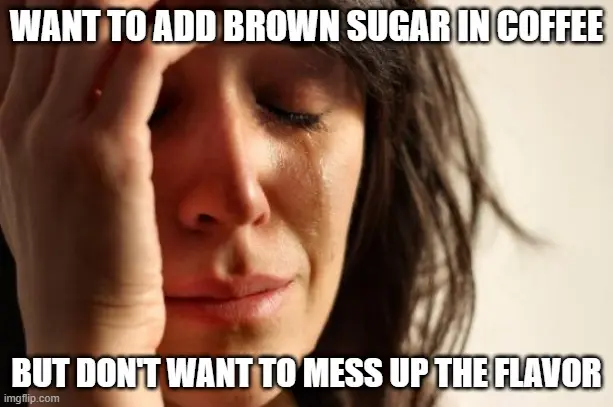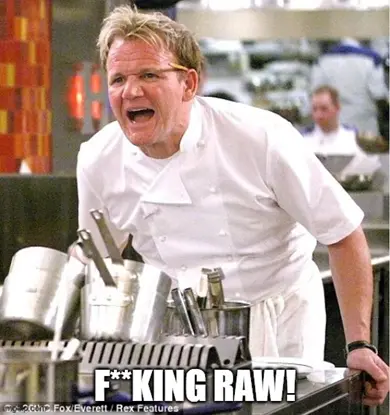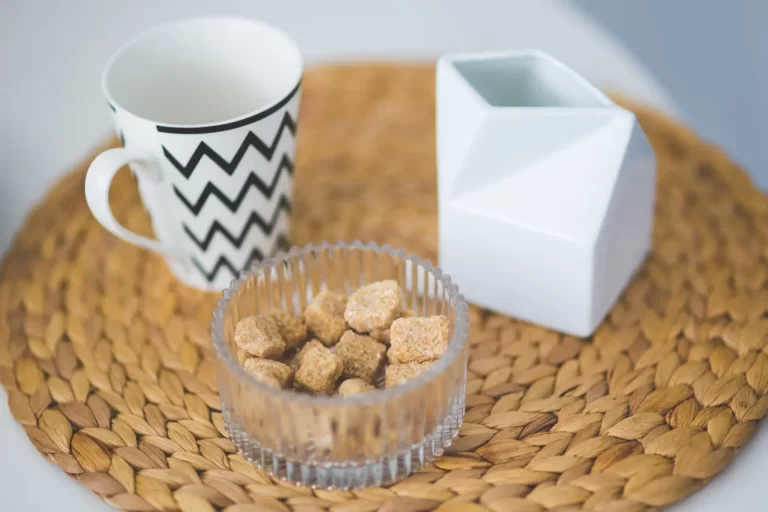When looking for alternatives to white sugar as a sweetener, brown sugar is an item you’ve come across quite a few times, along with maple syrup. But it’s understandable if you’re worried about messing up your cup by adding brown sugar in coffee as a sweetener.

Today, we’ll be discussing the ins and outs of brown sugar and how it can affect your coffee and, ultimately, coffee lovers like you.
What Is Brown Sugar?
The white sugar we all know and use every day is fully refined. Unrefined sugar is known by the term “brown sugar,” the name coming from the brown color of natural sugar.
Brown sugar comes from sugar cane and sugar beet, which contains a decent level of sucrose. Sucrose is used for regular table sugar production.
You can use brown sugar in its original form or simply brown sugar syrup to spice up your espresso shot or a latte cup.
Types of Brown Sugar
The molasses give brown sugar the moisture that makes it all soft. The amount of softness and moisture scales with molasses present in the sugar.
Molasses also affect the final taste since a higher molasses count means strong taste and darker sugar. Types of brown sugar are based on the amount of molasses each type contains.
Light Brown Sugar
Light brown sugar comes first in the list with a low 3.5% molasses. The low presence of molasses gives the sugar a lighter color and a mild taste.
The most common use for light brown sugar is baking cookies and making different sauces.
Dark Brown Sugar
Next on the list is dark brown sugar, with 5-6% molasses. For those who want to add an intense sugary taste to their food, dark brown sugar is the right choice to make.
Dark brown sugar has a darker color tone and a stronger flavor profile. It’s commonly used in gingerbread or other rich foods with sweetness as their basis.
Raw Sugar
This type of sugar is so unfiltered you could say that it’s. . .

Raw sugar can also be called “raw cane sugar” since it comes from sugarcane. Raw sugar is also the original form of sugar right after production.
Raw sugar has next to zero moisture, with large sugar crystals. The minerals are present in higher amounts than light and dark brown sugar. The molasses flavor creates a strong and tasteful cup of coffee.
Should You Try Brown Sugar In Coffee?
If you have never tried it before, the short answer is: “yes, you should”
There are elites out there who will tell you to “git gud” and not add anything to your coffee so you can experience the bitterness head-on. But I say, go out there and experience the new flavors.
After all, we drink coffee for relaxation and not as a challenge, right?
Brown sugar’s rich flavor profile adds some extra jazz to your cup of coffee while giving you the sweet relief (pun intended) from bitterness. Some people never looked back after using brown sugar in coffee just once.
You might be the next person in that club, so why not go ahead?
Having fun Nomies? Check out our piece on what is french roast coffee.
Which One To Use In Coffee: Brown Sugar Or White Sugar?
Let’s start with a confirmation: yes, you can put brown sugar in coffee.
If you compare brown sugar to white sugar, brown sugar comes out as a clear winner, simply because of its variety in terms of taste.
It’s because white sugar is only a sweetener that sweetens the food it’s added to, without having a unique flavor profile of its own, creating strong coffee.
Brown sugar has a really rich taste profile that adds sweetness to your coffee and provides a stronger flavor.
Since brown sugars are not dependent on the artificial refining process, adding them to your coffee gives you a heavier, earthier feeling while working as a natural sweetener.
Brown sugar can also add a darker color to your coffee without making it taste as bitter as it looks.
As with every other choice, it all comes down to your personal preference in the end. Looking just for a sweeter taste to overcome bitterness? Use white coffee. Want to sweeten your coffee with additional flavors in the cup? Use brown sugar.
How Much Brown Sugar In Coffee Do I Need?
This factor depends on the amount of brown sugar you use in your coffee and the brewing method.
The differences between white and brown sugar are so little that you won’t tell the difference if you aren’t informed beforehand. But even then, the type of brown sugar weighs in on the sweetness factor.
If you use light brown sugar, it will sweeten your coffee, and you will not feel any major difference from white sugar. If you use dark brown sugar, it will make your cup of coffee heavier with a richer taste while looking extra dark.
What Kind Of Coffee Goes Best With Brown Sugar?
Any medium-dark roast or dark roast should give you the best coffee taste notes with brown sugar. Dark roast coffee grounds taste better with sugar in them.
Another reason is the molasses of the sugar mixes with the roasted flavor notes of the coffee bean, enhancing the chocolatey, caramel flavor.
If you’re using a lighter roast, which is already sweet, using brown or raw sugar(which are basically large chunky crystals of sucrose) with it will create an over-sweetened coffee that might be too hard to swallow.
You can pick up robusta beans or robusta blends if you’re thinking about coffee beans. They are usually darkly roasted, allowing you to experiment with adding brown sugar to the coffee.
Is Brown Sugar Healthier As An Alternative For Sweetening Coffee?
We aren’t just eating to get full and go have a good nap in today’s world. We have a desire for knowledge, which has seeped into our eating habits, making us check for health benefits details of everything before eating them.
However, no matter how much of a negative sweetness is for the body, people still wish to continue making their morning cup of coffee sweetened with a dash of sugar.
With all that said, we need to consider if brown sugar is really a healthy alternative to sugar or not and if adding it to coffee makes your coffee drink healthy.
Brown and white sugars go through basically the same processes for production. The only difference is that white sugar goes through additional refining processes that ensure further refining.
On the other hand, brown sugar is less refined and focuses on a more natural flavor profile by using less chemical refining. As a result, it gains a better flavor profile.
Here’s a myth-busting statement: health benefits offered by brown sugar are almost as same as white sugar. There are better places to look for minerals that offer the same health benefits as sugar itself.
Brown sugar is not the ideal source for calorie-free sweetness. In fact, brown sugar carries slightly more calories, with a count of 17 kilocalories per teaspoon. White sugar carries 16 kilocalories per teaspoon.
So don’t go bulldozing through your brown sugar supply for that added health benefit that is pretty much non-existent.
Had fun reading? You’ll love to read our piece on how to sweeten coffee without sugar.
Bottom Line
Brown sugar in a cup of morning coffee makes it better overall, but it’s not as mythically healthy as it’s hyped up to be.
But still, it has its ups and downs for you to consider and choose if you want your coffee to have a new, stronger flavor. Use it according to your flavor preferences and personal coffee choices.
FAQs
Brown sugar tastes really good in coffee due to the additional flavor profile with the traditional sweetness.
Brown sugar provides you with several minerals beneficial to your health. Plus, brown sugars are more natural sweeteners due to less chemical processing. They also improve your taste of coffee.
Brown sugar is raw, unfiltered sugar produced from canes and beets.
If you are looking to add extra flavor to your cup of coffee while making it sweeter than usual, then yes, you should use brown sugar in your coffee.
One or two tablespoons of brown sugar should be enough. But it mainly depends on the type of brown sugar you are using. Use less sugar if you are using a lighter roast.

